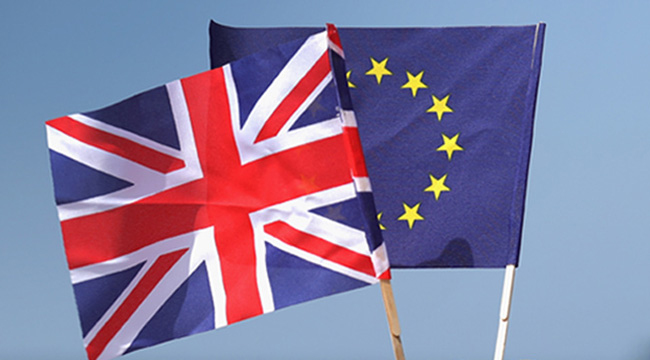
Early Friday morning, the United Kingdom descended into utter madness after its referendum to leave the European Union passed. More than half the population shrugged and decided a change might be for the best after four decades in the bloc. In today’s harsh daylight we can now access what’s to come after the 52 percent vote in favor of what’s come to be known as Brexit.
The move won’t happen right away, for the entire process will take years. But the immediate fallout has already been enormous. Once the results were announced, the British pound crashed to its lowest rate since 1985, while the safe-haven Japanese yen volleyed into volatile territory. This could effectively launch the U.K. into an economic recession while global stock markets are already reeling throughout Europe, Asia, and Australia.
For those who seek the tiniest silver lining, a vacation across the pond is sure to be inexpensive. However, the consequences of this referendum are far less fun. Leaving the E.U. will remove the economic and political benefits that the U.K. shared with the remaining 27 member states. No longer will free-flowing borders and a single market be givens. And the itch is spreading, for better or worse, with French and Dutch political parties already calling for similar referendums. Could Brexit signal the end of the European Union as we know it? Here’s why this could be one heck of a messy divorce.
The Blame Game Will Soon Shift
A few hours after the initial news, British Prime Minister David Cameron announced that he’s resigning his position after six years of service. He’ll stick around for three months to “steady the ship,” but he laments, “I do not think it would be right for me to be the captain that steers our country to its next destination.” Cameron promises to show the world that the U.K.’s economy is a strong one, but that’s an awfully optimistic goal after the pound nosedived. Media perception shows the vote as a direct “repudiation” of everything that Cameron symbolizes. But some misleading Brexit propaganda should soon see fingers pointed elsewhere.
Regardless of expressed optimism, Cameron will trek to Brussels next week and meet with leaders of the remaining member states. However, Cameron announced that he won’t trigger the E.U. treaty’s Article 50 to begin secession. That will happen in the fall under the next prime minister, which will probably be a Brexit campaign leader. Boris Johnson, perhaps?

A Protracted Battle Or A Quick Settlement?
“Leave” was never expected to win, but that’s exactly what happened. Perhaps this “oh sh*t, this ridiculousness wasn’t supposed to succeed” fallout will provide the world a glimpse into the November U.S. elections, but for now, the U.K. twists alone in the wind. The secession process is expected to take two years, which is the period of time allowed for negotiations but surely won’t be enough to finish setting up trade and free-movement agreements, let alone satisfy all of the concerns flowing from financial and employment sectors.
The E.U. could always tell the rebellious state to get lost before the two-year point, which would promote a chillier atmosphere. But the transition period is secure, and careful negotiations shall determine what type of deal the U.K. scores. If the country adopts Norway’s strategy, it will retain free movement across borders and stay associated with the EU as a member of the European Economic Area. Yet the U.K. would still contribute to the E.U. budget — this sounds a whole lot like alimony. Or the U.K. could completely opt out of the E.U. while adhering (like China or the U.S.) to World Trade Organization rules, which could wreak even more havoc upon the economy. Market access will be a huge question and may have the greatest effect on whether the U.K. shall prosper.
The Family May Not Stay Together
In any divorce, things immediately grow more complicated with the presence of children. However, England, Wales, Scotland, and Northern Ireland are all adults and enjoy separate and distinct personalities, but these four countries may no longer be “united” after Brexit settles. Scottish citizens expressed opposition to leaving the EU before the referendum, and all 32 authorities within the country voted to stay. First Minister Nicola Sturgeon reacted to the Leave victory by acknowledging how “the people of Scotland see their future as part of the European Union.”
The clear choice of Scotland to remain in the union could re-trigger some angst that was reflected in a 2014 motion for Scotland to leave the U.K. At that point, 44 percent of voters hoped to become an independent country. There’s a possibility of a ballot arising again, for the Brexit decision would count as a “significant and material” change required to trigger such a move. Considering how unequivocally Scottish voters wish to remain in the E.U., there’s quite the possibility that the country could go rogue and enter the E.U. on its own.
The Lawyers Will Make A Killing
In many divorces, lawyers reap the greatest benefit while warring parties walk away with less than they expected. For sure, legal teams will find themselves in high demand during the transition period as banks, manufacturers, and employers struggle to adapt to uncertain circumstances. Many contracts will need immediate retooling. Further adjustments will come as trade and border guidelines get hammered out. This is not shaping up to be an amicable split. This will be an all-out messy separation, and the lawyers will benefit most in the short term. Long term, however, all barristers will find themselves in the same position as the rest of the United Kingdom.
